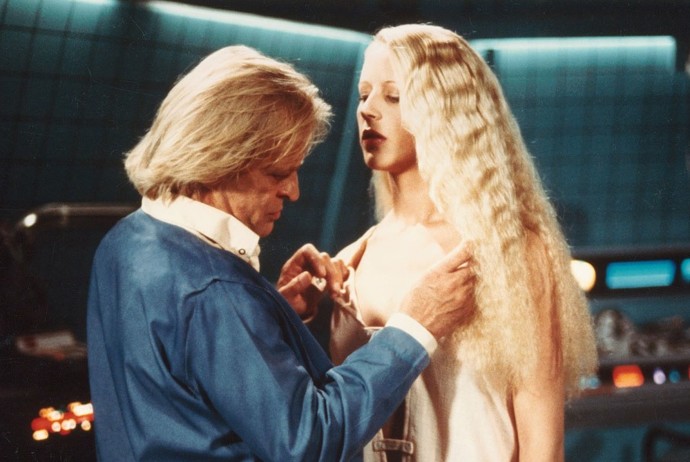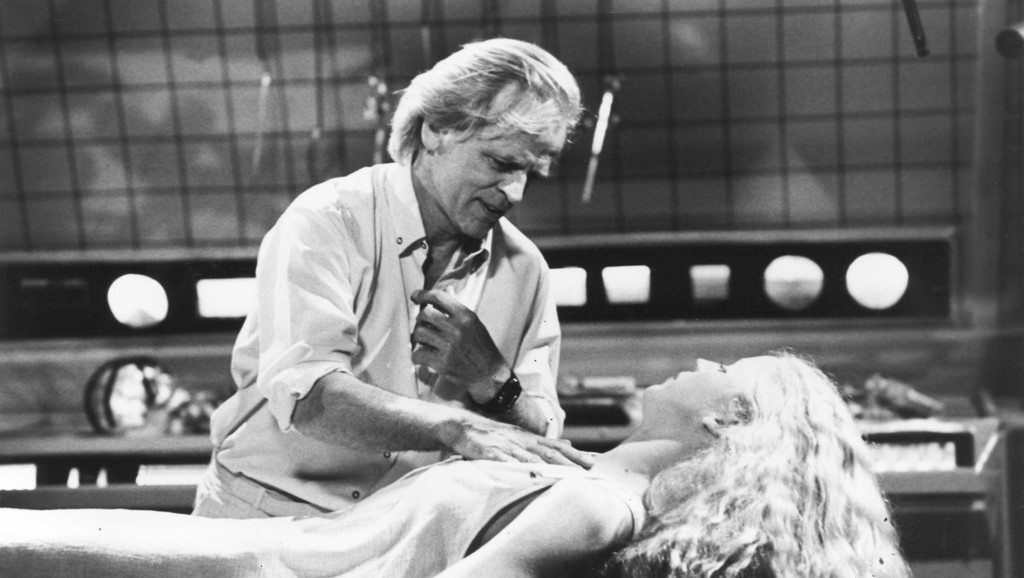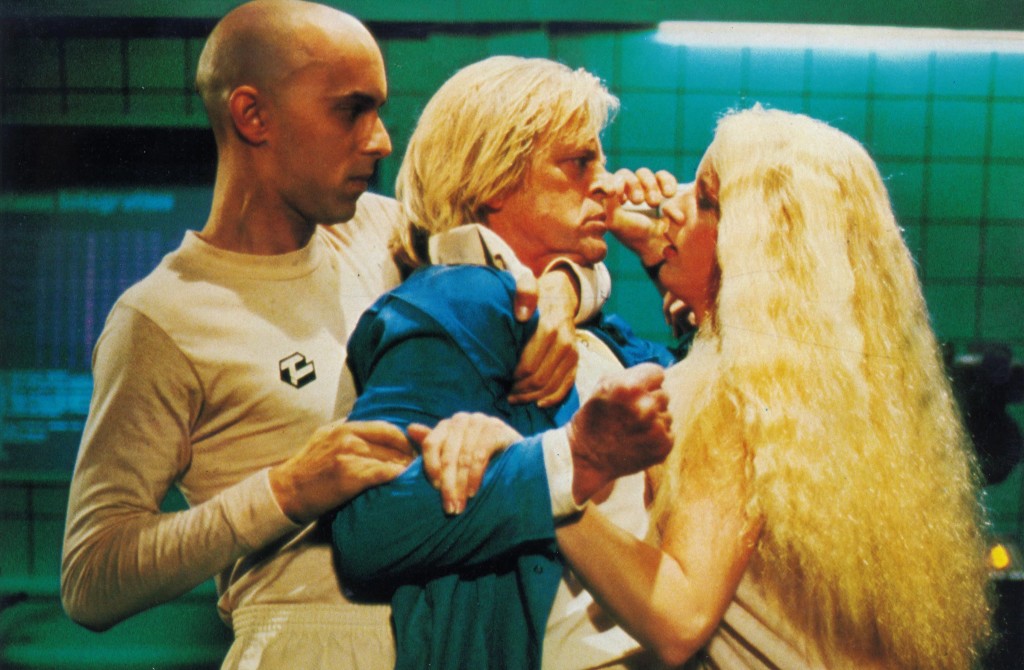Dir: Aaron Lipstadt
Star: Don Keith Opper, Brie Howard, Klaus Kinski, Norbert Weisser
“I thought it was a clever little movie. It is the first movie I’ve done that children might like. The greatest thing in the world is to do something for children.”
– Klaus Kinski
Hmm. Not sure I’d entirely agree with Kinski on its suitability for a younger viewing audience, but I can kinda see where that’s coming from. This plays almost like a sci-fi reworking of Pinocchio, centered on an artificial boy, who wants nothing more than to be truly human, with all that entails, both good and bad. However, with Kinski in the role of Gepetto, you won’t be surprised to hear that the results are rather darker. There’s no Jiminy Cricket here to provide a sense of conscience; instead, it’s all morality through circuitry. I did read one review that suggested it was a sci-fi version of Rebel Without a Cause, calling it “a game fantasy about children rebelling against their parents,” though Opper is obviously much more well-mannered version of James Dean. Indeed, having helped bring two children through their teenage years to adulthood, the slight backtalk we see here hardly registers as rebellion (our general rule of thumb was, if the police weren’t involved, it didn’t count!).
Coming out a few months after Blade Runner, this covers a similar theme – what does it mean, to be “human”? – albeit in a much smaller, low-key way. Like Runner, it’s set a little way into the future, in a corporation-controlled world. The location is a space-station, formerly a busy hub, but now reduced to a skeleton crew of Dr. Daniel (Kinski) and his android assistant, Max (Opper – though credited in the movie as “introducing Max 404”). Android research has been banned on Earth after some unfortunate incidents, hence their re-location beyond the reach of planetary laws. What disturbs this idyll is the arrival of a trio of escaped criminals, Maggie (Howard), Keller (Weisser) and her lover, Mendes (Crofton Hardester). When Max also realizes that his creator is working on a new, improved (and female!) android called Cassandra, that will lead to Max being terminated, he opts to throw his lot in with the criminals and assist their plan to escape back to Earth. But the good doctor has his own plans for Maggie, involving the transfer of her sexual experience in to Cassandra.
Shot in 20 days – 19 on set, plus one on location in an arboretum – and edited in three weeks, this was originally a production for Roger Corman’s New World studio, test screenings led Corman to shelve it, but producers Barry Opper (Don’s brother) and Rupert Harvey bought the rights back, and took it on the film festival circuit, where it was fairly well-received. It certainly isn’t a typical Corman production, even though it does recycle some production elements such as sets and props from his earlier space operatic works like Battle Beyond the Stars – as an aside, James Cameron worked on this, as a design consultant in the art department! However, it’s much more restrained and thoughtful rather than exploitative: you can’t imagine many other Corman films which would have a montage of clips from Fritz Lang’s Metropolis, played out to a soundtrack of James Brown’s It’s a Man’s, Man’s, Man’s World.
It’s also fairly cynical in its view of humanity: while it’s difficult to provide specifics without spoiling the film’s big surprise, let’s just say that neither mankind, nor their creations, exactly come over as paragons of virtue. I found Maggie the most sympathetic character; she’s a white-collar criminal, as opposed to her more psychopathic colleagues. Kinski’s doctor is more creepy than anything else, and he’s clearly operating in mad scientist mode, virtually bereft of all human interaction skills. Initially, this seems a result of his being isolated, with no-one to communicate with, except an android he himself programmed; subsequent events, however, put a different spin on things, though you could certainly argue they raise as many questions as they answer. Apparently, Kinski refused to block out scenes or even rehearse with the other actors – and rookie director Lipstadt was probably in no position to argue, though it has to be said, it’s a decision which likely enhances the feeling of disassociation between the doctor and everyone else.
The production values are pretty clunky. We’re now closer to the setting of 2036 than we are to the film’s release, and there are aspects of the “future” it portrays which will simple seem woeful [half a century of progress has not, apparently, moved us past green-screen monitors]. The small budget – variously reported as from half a million to a million dollars – is somewhat disguised by the fact that there is a very small cast and only a handful of sets, but the spaceship effects are so bad they probably would have been better off not bothering. Random factoid I want to drop in here, for want of a better location: one of the landing party which arrives on the station near the end is Rachel Talalay, who’d go on to direct Tank Girl, in her only acting role.
Still, it’s an interesting concept, albeit one that’s largely derivative of its ideas from previous, better movies. It was also the film debuts of both Opper and Howard – can you imagine your first movie role being to star opposite Kinski? She had been a drummer in an all-girl rock band, while he had previously worked as a carpenter for Corman, and between them, they succeed in holding the film together, with the bulk of the screen time. In particular, he carries out the shift from a wide-eyed innocent, curious about sex, to ruthless killing machine, obeying the instructions of his revised programming, with some deftness, and the themes the movie covers have also stood the test of time, rather better than the effects. If it’s no Blade Runner or Metropolis, certainly nor is it the Plan 9 I feared this might be.


